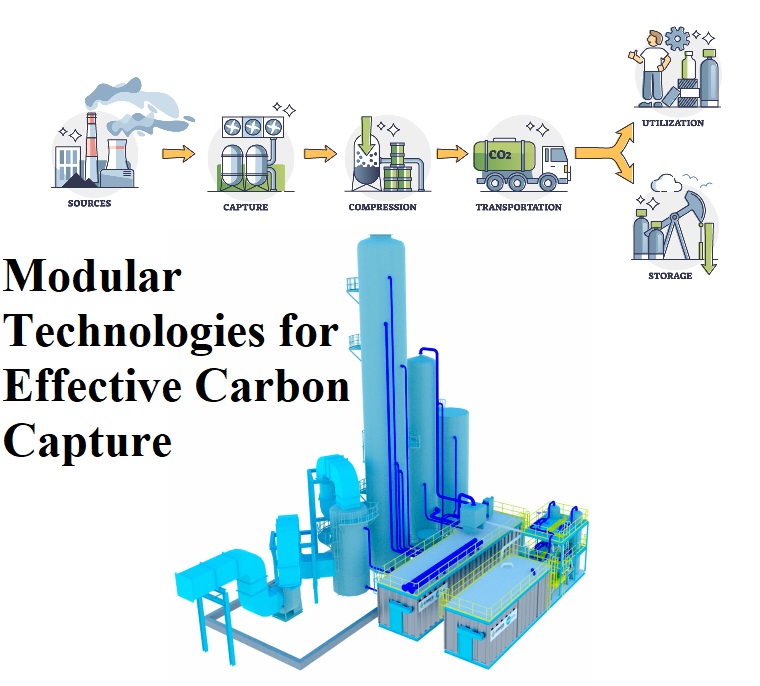As the world grapples with climate change and its myriad consequences, effective carbon capture technologies have emerged as a pivotal solution.
The following article highlights the way in which modular technologies in particular are transforming how we approach carbon capture, offering flexibility, scalability, and efficiency in reducing greenhouse gas emissions.
Understanding Carbon Capture
Carbon capture and storage (CCS) involves capturing carbon dioxide (CO2) emissions at their source, transporting them, and then storing them underground to prevent them from entering the atmosphere.
Traditional methods have often been large-scale and costly, making widespread adoption challenging. However, modular carbon capture technologies are changing the game by allowing for smaller, more adaptable systems that can be implemented in various settings. In developing effective carbon capture solutions, it’s important to note that many areas of the biogas industry use solvents to enhance the efficiency of CO2 removal processes.
The Advantages of Modular Technologies
Flexibility and Scalability
One of the most significant advantages of modular technologies is their flexibility. Unlike traditional carbon capture systems that require substantial infrastructure and capital investment, modular units can be designed and installed incrementally. This approach allows facilities to scale their carbon capture capacity according to their specific needs, making it economically viable for smaller operations and enabling faster deployment.
Cost-Effectiveness
Modular carbon capture systems often have lower initial costs compared to traditional CCS technologies. By leveraging standardized components and manufacturing processes, companies can reduce production costs and installation times. This cost-effectiveness is crucial in encouraging more businesses to adopt carbon capture solutions, ultimately leading to a broader impact on global emissions reduction.
Diverse Applications
Modular carbon capture technologies can be applied across various industries, including energy, manufacturing, and even agriculture. This versatility enables different sectors to contribute to carbon reduction efforts, ensuring that the transition to a low-carbon economy is inclusive and comprehensive. For instance, modular systems can be integrated into existing power plants, allowing them to capture emissions without needing to build entirely new facilities.
Innovative Modular Technologies in Carbon Capture
Direct Air Capture (DAC)
One of the most promising modular technologies in carbon capture is direct air capture (DAC). DAC systems work by pulling CO2 directly from the atmosphere, which can then be stored or utilized. These systems can be deployed in various locations, allowing for significant flexibility in implementation. Companies like Climeworks and Carbon Engineering are leading the charge in this area, developing scalable DAC solutions that can effectively reduce atmospheric CO2 concentrations.
Carbon Capture Utilization and Storage (CCUS)
Modular carbon capture systems are also being developed for carbon capture utilization and storage (CCUS), where captured CO2 is repurposed for various industrial applications.
For example, captured CO2 can be converted into synthetic fuels or used in the production of building materials. This dual approach not only reduces emissions but also creates economic opportunities through innovative applications.
Integrated Modular Solutions
Some companies are exploring integrated modular solutions that combine multiple carbon capture technologies into a single system. These approaches can enhance overall efficiency and effectiveness, allowing for better CO2 removal rates and cost savings. By optimizing the capture process, these integrated systems can significantly contribute to global climate goals.
The Future of Carbon Capture
The future of carbon capture lies in the continued development and deployment of modular technologies. As governments and businesses seek to meet climate targets, investing in these innovative solutions will be crucial. With their flexibility, cost-effectiveness, and broad applicability, modular carbon capture technologies are poised to play a vital role in reducing global greenhouse gas emissions and combatting climate change.
In conclusion, the advancement of modular technologies in carbon capture represents a significant step towards a more sustainable future. By making carbon capture accessible and effective across various sectors, we can take meaningful action against climate change and work towards a cleaner, healthier planet for future generations.
